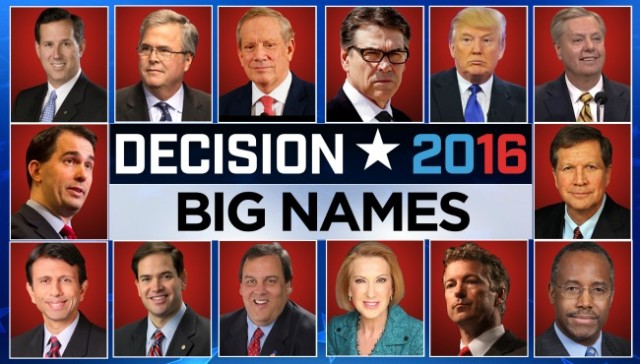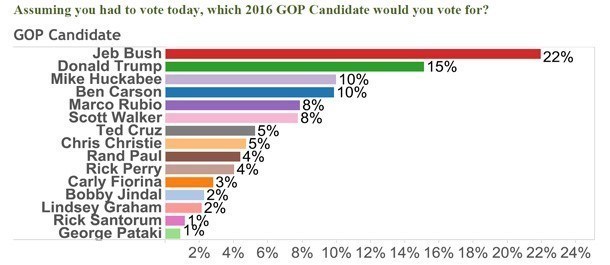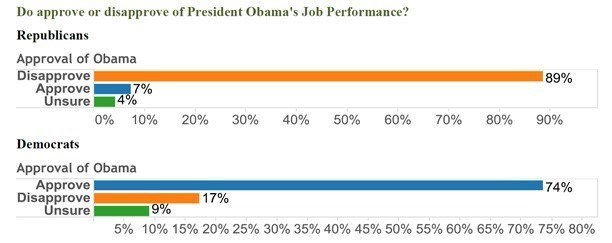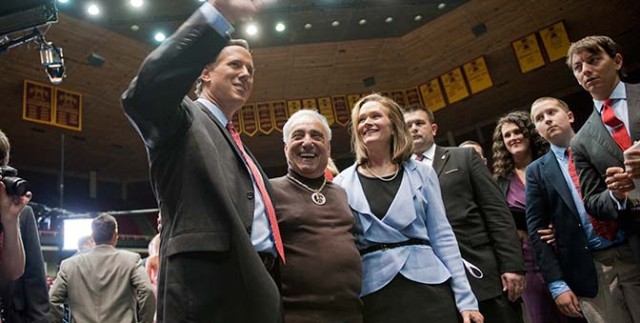Jeb Bush is trying to distance himself from Common Core.

He is avoiding using the term, and when he was asked about Common Core while campaigning in Iowa on Friday, August 14, 2015, Bush responded, “The term Common Core is so darned poisonous, I don’t even know what it means anymore.”
He’s just a guy who supports “state-created higher standards”:
Bush has previously described the standards as “poisonous politically,” but on Friday, he seemed thoroughly exasperated by the term itself and looked to move past it.
“I’m for higher standards – state-created, locally implemented – where the federal government has no role in the creation of standards, content or curriculum,” Bush said in Iowa.
He doesn’t say that the government should have no role in creating assessments. Strategic omission since the federal government obviously funded two Common Core assessment consortia, PARCC and Smarter Balanced.
Jeb Bush arrived very late to the “I just want higher standards” party, but here he is, nonetheless. However, Jeb Bush knows full well the well-founded criticisms of the Common Core. On December 1, 2011, the American Legislative Exchange Council (ALEC), an organization in which Jeb Bush is active and highly influential, actually passed a model resolution opposing Common Core, the purpose of which was for legislators to carry back to their Common Core-endorsing states in order to formally oppose Common Core.
Here is the text of that resolution:
Resolution Opposing the Implementation of the Common Core State Standards Initiative
Model Resolution
WHEREAS, high student performance and closing the achievement gap is fundamentally linked to an overall reform of our public education system through a strong system of accountability and transparency built on state standards, and
WHEREAS, the responsibility for the education of each child of this nation primarily lies with parents, supported by locally elected school boards and state governments, and
WHEREAS, common standards have resulted in increased decision making on issues of state and local significancewithout the input of state and local stakeholders, and
WHEREAS, no empirical evidence indicates that centralized education standards necessarily result in higher student achievement, and
WHEREAS, special interest groups can expose the vulnerability of the centralized decision making that governs common standards and lower the standards’ rigor and quality to suit their priorities, and
WHEREAS, adoption of the Common Core standards would force several states to lower their standards, and
WHEREAS, the National Assessment of Educational Progress national test already exists and allows comparisons of academic achievement to be made across the states, without the necessity of imposing national standards, curricula or assessments, and
WHEREAS, imposing a set of national standards is likely to lead to the imposition of a national curriculum and national assessment upon the various states, a clear violation of the Elementary Secondary Education Act, and
WHEREAS, claims from the Common Core Initiative that the Common Core will not dictate what teachers teach in the classroom are refuted by language in the standards as written, and
WHEREAS, common standards will continue to lessen the ability for local stakeholders to innovate and continue to make improvements over time, and
WHEREAS, when no less than 22 states face budget shortfalls and Race to the Top funding for states is limited, $350 million for consortia to develop new assessments aligned with the Common Core standards will not cover the entire cost of overhauling state accountability systems, which includes implementation of standards and testing and associated professional development and curriculum restructuring, and
WHEREAS, local education officials, school leaders, teachers, and parents were not included in the discussion, evaluation and preparation of the standards that would affect students in this state.
NOW, THEREFORE, BE IT RESOLVED that the {legislative body} of the state of {name of state} rejects any policies and procedures that would be incumbent on the state based on the Common Core State Standards Initiative. [Emphasis added excepting bolded, capped words.]
However, on November 19, 2012– almost a year following the ALEC vote to oppose CCSS– Jeb Bush’s Foundation for Excellence in Education (FEE) promoted the idea of an ALEC “final final vote.” The person promoting this idea was none other than former ALEC Education Task Force Director-gone-FEE Communications Specialist David Myslinski. Below is an excerpt:
Over the weekend, the American Legislative Exchange Council (ALEC) rejected an anti-Common Core bill, thus completing its 18-month exploration of the Common Core State Standards.This action reaffirmed ALEC’s position that states should be in charge of their education standards and supports the option for states to freely adopt Common Core.
By rejecting the bill, which would have tied the hands of state legislators, ALEC made clear its support of states raising student expectations through higher standards—working in consort with other states or working independently.[Emphasis added.]
Jeb Bush influenced ALEC to ditch its detailed resolution against Common Core. For Bush’s FEE to insinuate that a non-official piece of ALEC-generated model legislation would somehow have “tied legislator hands” is not enough to conceal the hypocrisy that the ALEC about-face was a Jeb Bush effort to “tie legislator hands” in favor of Common Core.
That Bush has faithfully campaigned for that Common Core is no secret. In April 2014, Bush told New York Times reporter Peter Baker that defending Common Core “was the right thing to do”:
… [Bush] made clear he would not shrink from views scorned by the dominant wing of the party. He defended his commitment to the so-called Common Core set of educational standards. “I just don’t feel compelled to run for cover when I think this is the right thing to do for our country,” he said.
And in November 2014, when Bush addressed his FEE, he clearly backed Common Core as though it were empirically proven to remedy all that ails American public education. As the Washington Times reports, Bush speaks of needing to “experiment” and “improve based on evidence”:
“We should be willing to experiment. We should always look to improve our thinking based on the evidence. This is why the debate over the Common Core State Standards has been troubling,” he said Thursday in a keynote address at a gathering of Foundation for Excellence in Education, a group he founded after his tenure as Florida governor ended in 2007.
“I respect those who have weighed in on all sides of this issue. Nobody in this debate has a bad motive. But let’s take a step back from this debate for a second,” he continued. “Only a quarter of our high school graduates who took the ACT are fully prepared for college. More than half who attend community college need to take some kind of remedial course. Six hundred thousand skilled manufacturing jobs remain unfilled because we haven’t trained enough people with those skills. And almost a third of high school graduates fail the military entrance exam. Given this reality, there is no question we need higher academic standards and — at the local level — diverse high-quality content and curricula. And, in my view, the rigor of the Common Core State Standards must be the new minimum in classrooms.” [Emphasis added.]
In November 2014, Bush was certain about his push for Common Core. In November 2014, Bush’s very public view was that America should be willing to “experiment” with Common Core. Now, he could not ask America to consider the evidence that Common Core would actually deliver since the experiment must precede the “wait and see.” However, Bush does not promote Common Core “results” as “wait and see”; he promotes Common Core as the Known and Recognized American Public Education Solution.
But that was nine months ago.
It’s now August 2015, and the political pressure to remain wed to Common Core has Jeb Bush reckoning with a Common Core poison that apparently has given him some amazing memory loss.
He isn’t even sure what Common Core means anymore.
But I think Jeb Bush most certainly does know what Common Core means:
According to RealClearPolitics, in the Iowa Republican Presidential Caucus for August 7 – 11, 2015, Bush is sitting at 7th place.
His Common Core faithfulness is albatrossing his efforts at being the third Bush to reside at 1600 Pennsylvania Avenue.

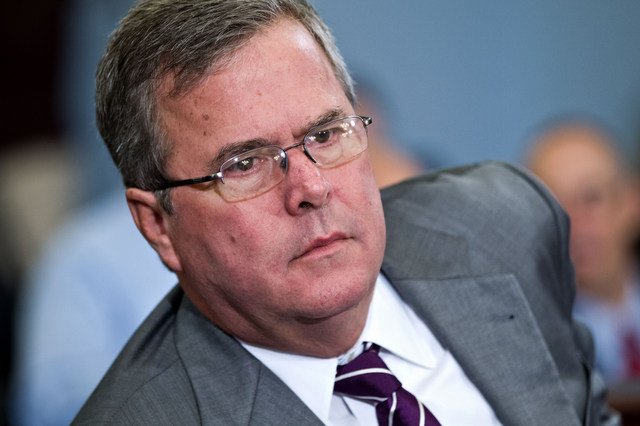
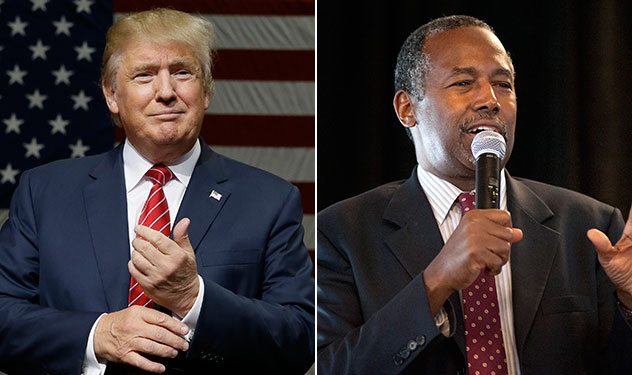
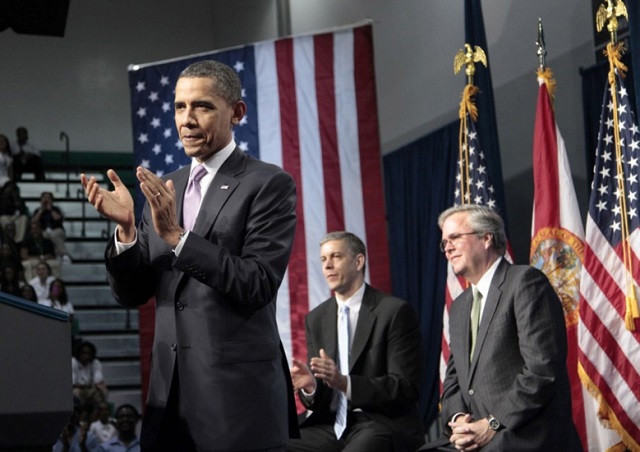


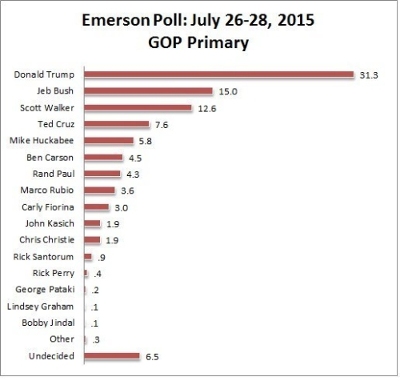
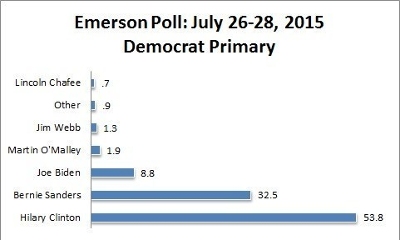
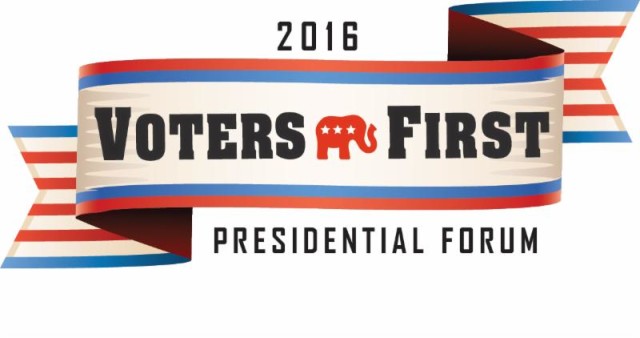
 NEW YORK
NEW YORK

